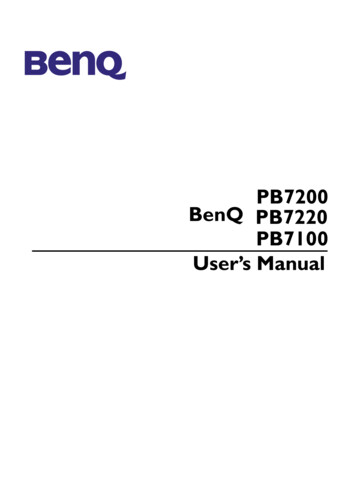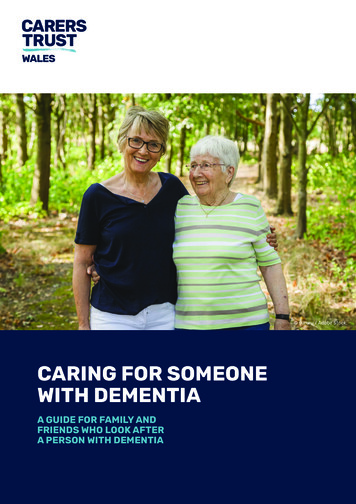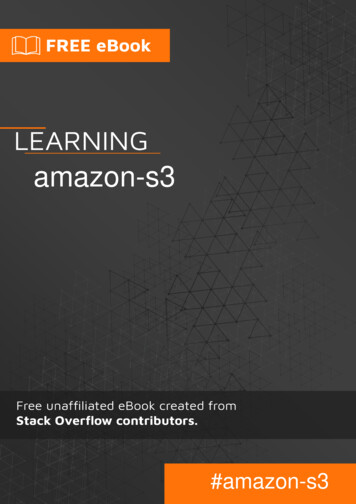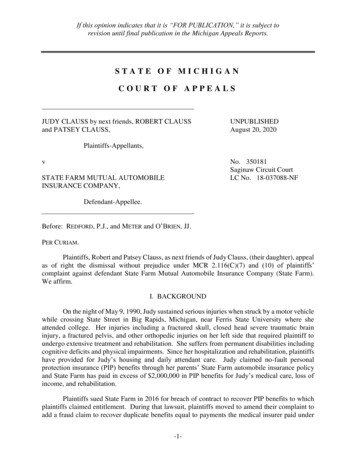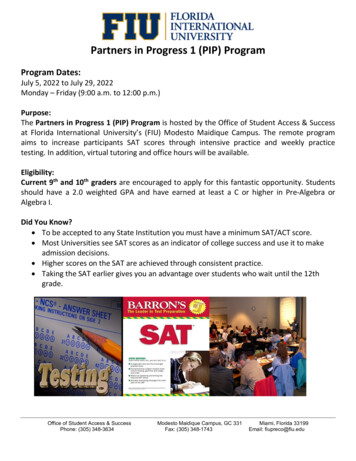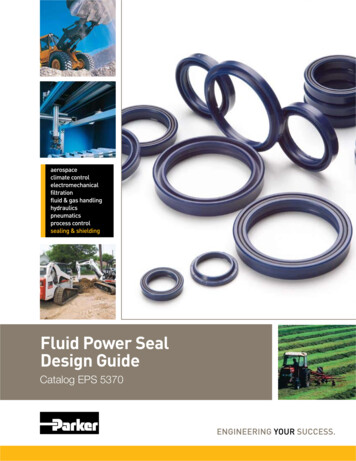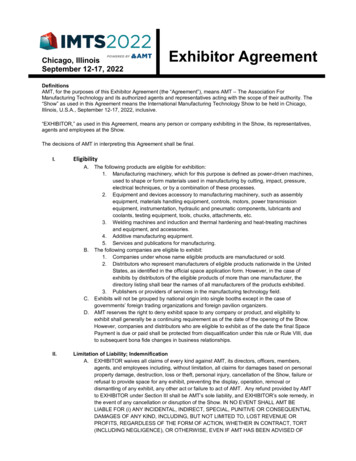
Transcription
PersonalIndependencePayment (PIP)If you are looking after someone who has a disability or illness and isaged from 16 to below their state pension age, they may be entitled toPersonal Independence Payment (PIP).See carersuk.org/covid-19-a-z for specific updates relating to PersonalIndependence Payment during the COVID-19 pandemic.This information covers England, Wales, Scotland and Northern Ireland.ContentsWhat is PIP? .2Who can claim PIP? .2When can you claim PIP? .3How much is PIP worth and how is it assessed? .4How to claim PIP . 13If you have a terminal illness .15What happens if you already get Disability Living Allowance (DLA)? .16The decision . 18Challenging a decision .18What to do if your circumstances change .19Other help you may qualify for . 20Residence and presence .23Further help . 242021/22
Factsheet UK1026 1118 – Personal Independence Payment (PIP)What is PIP?PIP is a benefit paid to people who have daily living and/or mobility needs,to help with the extra costs of long-term illness or disability.PIP is replacing DLA (Disability Living Allowance) for people who are 16 orover – but under state pension age.PIP can be paid regardless of your income, savings or National Insurancecontribution record and is a tax-free benefit. You can get PIP even if youare working or studying. If you are a carer who also has care needs, youcan claim PIP for yourself and this will not affect your Carer’s Allowance.Getting PIP does not decrease other benefits; it may even increase them.If you have a carer, claiming PIP may help them to qualify for certainbenefits (such as Carer’s Allowance). PIP may also entitle you and/or yourcarer to further help with Council Tax.There are no restrictions on how you can spend your PIP money; you donot have to spend it on paying for the care that you need. However, yourcouncil or trust can take PIP into account when calculating how much youmight need to pay for any care services you receive.Note for Scotland: Adult Disability Payment will over time replacePersonal Independence Payment for disabled people in Scotland. Thiswill be piloted from spring 2022 and will be available across thecountry by summer 2022. As this develops, further information will beavailable at carerscotland.orgWho can claim PIP?To qualify for PIP you must meet all the following criteria:You are aged from 16 to below your state pension age (or if you arebeing reassessed, you were under 65 on 8th April 2013 in England,Wales or Scotland or were under 65 on 20th June 2016 in NorthernIreland).2
Factsheet UK1026 1118 – Personal Independence Payment (PIP)You satisfy the daily living and/or mobility activities test (pages 4-12).You have satisfied the test for at least three months and are likely tocontinue to satisfy the tests for at least nine months after the threemonth qualifying period. You can make your claim before the threemonths have passed, but you will not receive any payment until theyhave.You have no immigration conditions attached to your stay in the UKsubject to some exceptions. If you have immigration restrictions onyour stay in the UK, claiming benefits may affect your future right toremain in the UK. Seek specialist immigration advice before claiming– you can search for immigration specialists atfind-legal-advice.justice.gov.uk or lawsoc-ni.org/solicitors in NorthernIreland.You meet the residence and presence conditions (see page 23).Note: You will be able to stay on PIP if you claimed or received itbefore you reached your state pension age.Note: If you are terminally ill, there are simpler rules that make iteasier to apply – see page 15 for further details.When can you claim PIP?If you are aged from 16 to below your state pension age and are notalready getting DLA, you can claim PIP now.If you are aged 16 and were under 65 on 8th April 2013 (in England,Wales and Scotland) or were under 65 on 20th June 2016 (in NorthernIreland) and are already getting DLA, then at some point you will bereassessed for PIP by the Department for Work and Pensions (DWP)(Department for Communities in Northern Ireland). This will happen whenone of the following conditions applies:3
Factsheet UK1026 1118 – Personal Independence Payment (PIP)you reach 16 years of age (unless you are a child and have beenawarded DLA under the special rules for terminal illness)there is a reported change to your care or mobility needsyou have a DLA fixed award due to expireyou choose to claim PIP instead of your DLA.Note: DLA claimants do not need to take any action regarding theirPIP re-assessment until they are told to do so by the DWP(DfC in Northern Ireland).How much is PIP worth?There are two components of PIP:a daily living componenta mobility componentEach component can be paid at either:standard rate – where your ability to carry out daily living/ mobilityactivities is limited by your physical or mental conditionenhanced rate – where your ability to carry out daily living/ mobilityactivities is severely limited by your physical or mental condition.Standard EnhancedDaily living component 60 89.60Mobility component 23.70 62.55How is PIP assessed?In order to qualify for PIP you will have to score a certain number of pointsin relation to 12 activities. Ten of these activities assess daily living and twoof these activities assess mobility.4
Factsheet UK1026 1118 – Personal Independence Payment (PIP)Within each activity there is a set of ‘descriptors’ or tests. There is a rangeof points that can be scored based on whether you fit a descriptor withinthese activities. You can score points for more than one activity, but if morethan one descriptor applies in any one activity, you will be awardedwhichever descriptor gives you the most points.You will be awarded points if the descriptor applies to you all of the time, orif you can show that a descriptor applies to you for more than half of thedays within a 12-month period.In order for a descriptor to apply to you, you must be able to carry out theactivity it describes “reliably”, which means:safely – in a fashion that is unlikely to cause harm to yourself or toanother personto an acceptable standardrepeatedly – as often as the activity being assessed is reasonablyrequired to be completedin a reasonable time period – no more than twice as long as themaximum period that a non-disabled person would normally take tocomplete that activity.If you are unable to carry out the activity in the above manner, thisdescriptor will not apply to you, and you should move on to the nextdescriptor to see if that better suits your situation.To be awarded the standard rate of the daily living component, you have toscore at least eight points from the ten activities that assess daily living(activities 1-10). To be awarded the enhanced rate of the daily livingcomponent you have to score at least 12 points from the ten activities thatassess daily living (activities 1-10).To be awarded the standard rate of the mobility component, you have toscore at least eight points from the two activities that assess mobility(activities 11-12). To be awarded the enhanced rate of the mobilitycomponent, you have to score at least 12 points from the two activities thatassess mobility (activities 11-12).5
Factsheet UK1026 1118 – Personal Independence Payment (PIP)Assessment criteriaBelow are the 12 activities, and the range of descriptors within eachactivity.Daily Living ActivitiesActivity 1 – Preparing food.This activity is not a reflection of your cooking skills, but instead looks at theimpact of your health condition on your ability to carry out the tasksrequired to cook a simple meal. It assesses your ability to open packaging,serve food, peel and chop food and use a microwave oven or cooker hobto cook or heat food. A simple meal is a cooked one-course meal for oneperson from fresh ingredients.ACan prepare and cook a simple meal unaided.0BNeeds to use an aid or appliance to be able to either prepare or cook asimple meal.2CCannot cook a simple meal using a conventional cooker but is able to doso using a microwave. (For example, this may apply if you cannot safelyuse a cooker hob and hot pans.)2DNeeds prompting to be able to either prepare or cook a simple meal.2ENeeds supervision or assistance to either prepare or cook a simplemeal.4FCannot prepare and cook food.8Activity 2 – Taking nutrition. This activity considers your ability to benourished, either by cutting food into pieces, conveying to the mouth,chewing and swallowing; or through the use of therapeutic sources. (Atherapeutic source means parenteral or enteral tube feeding using a ratelimiting device such as a delivery system or feed pump.)ACan take nutrition unaided.0BNeeds:- To use an aid or appliance to be able to take nutrition; or- Supervision to be able to take nutrition; or- Assistance to be able to cut up food.2CNeeds a therapeutic source to be able to take nutrition.26
Factsheet UK1026 1118 – Personal Independence Payment (PIP)DNeeds prompting to be able to take nutrition.4ENeeds assistance to be able to manage a therapeutic source to takenutrition.6FCannot convey food and drink to their mouth and needs another personto do so.10Activity 3 – Managing therapy or monitoring a health condition.This activity considers your ability to appropriately take medications in adomestic setting that are prescribed or recommended by a registereddoctor, nurse or pharmacist; monitor and detect changes in your healthcondition; and manage therapeutic activities that are carried out in adomestic setting that are prescribed or recommended by a registereddoctor, nurse or pharmacist or healthcare professional regulated by theHealth Professions Council. Note: ‘managing therapy’ does not includetaking or applying, or otherwise receiving or administering, medication, ormonitoring a health condition – these activities can only score a maximumof 1 point under descriptor B.Either:- Does not receive medication or therapy or need to monitor ahealth condition or;- Can manage medication or therapy or manage a health conditionunaided.Needs any one or more of the following:- To use an aid or appliance to be able to manage medication;- Supervision, prompting or assistance to be able to managemedication- Supervision, prompting or assistance to be able to monitor ahealth condition.0CNeeds supervision, prompting or assistance to be able to manage therapythat takes no more than 3.5 hours a week.2DNeeds supervision, prompting or assistance to be able to manage therapythat takes more than 3.5 but no more than 7 hours a week.4ENeeds supervision, prompting or assistance to be able to manage therapythat takes more than 7 but no more than 14 hours a week.6FNeeds supervision, prompting or assistance to be able to manage therapythat takes more than 14 hours a week.8AB1Activity 4 – Washing and bathing. ‘Washing’ means cleaning one’s wholebody, including removing dirt and sweat. ‘Bathing’ means getting into and7
Factsheet UK1026 1118 – Personal Independence Payment (PIP)out of either a standard bath or shower.ACan wash and bathe unaided.0BNeeds to use an aid or appliance to be able to wash or bathe.2CNeeds supervision or prompting to be able to wash or bathe.2DNeeds assistance to be able to wash either their hair or their body below thewaist.2ENeeds assistance to be able to get in or out of a bath or shower.3FNeeds assistance to be able to wash their body between the shoulders andwaist.4GCannot wash and bathe at all and needs another person to wash their entirebody.8Activity 5 – Managing toilet needs or incontinence. Toilet needs meansthe ability to get on and off the toilet, evacuation of the bladder and bowel,and cleaning yourself afterwards. Managing incontinence means the abilityto manage evacuation of the bladder and/or bowel including usingcollecting devices and cleaning yourself afterwards. If you use a catheterand/or collecting device, this is considered as incontinence for thepurposes of this activity.ACan manage toilet needs or incontinence unaided.0BNeeds to use an aid or appliance to be able to manage toilet needs orincontinence.2CNeeds supervision or prompting to be able to manage toilet needs.2DNeeds assistance to be able to manage toilet needs.4ENeeds assistance to be able to manage incontinence of either bladder orbowel.6FNeeds assistance to be able to manage incontinence of both bladder andbowel.8Activity 6 – Dressing and undressing. This activity considers your abilityto put on and take off culturally appropriate, un-adapted clothing that issuitable for the situation.ACan dress and undress unaided.08
Factsheet UK1026 1118 – Personal Independence Payment (PIP)BNeeds to use an aid or appliance to be dress or undress (For example,suitable aids could include modified buttons, zips, front-fastening bras, Velcrofastenings and shoe aids).2CNeeds either:– prompting to be able to dress, undress, or determine appropriatecircumstances for remaining clothed or– prompting or assistance to be able to select appropriate clothing.2DNeeds assistance to be able to dress or undress their lower body.2ENeeds assistance to be able to dress or undress their upper body.4FCannot dress or undress at all.8Activity 7 – Communicating verbally. Basic verbal information isinformation conveyed in a simple sentence. Complex verbal information isinformation conveyed in either more than one sentence or one complicatedsentence.ACan express and understand verbal information unaided.0BNeeds to use an aid or appliance to be able to speak or hear.2CNeeds communication support to be able to express or understand complexverbal information.4DNeeds communication support to be able to express or understand basicverbal information.8ECannot express or understand verbal information at all, even withcommunication support.12Activity 8 – Reading and understanding signs, symbols and wordsBasic information is signs, symbols or dates. Complex information is morethan one sentence of written or printed standard size text – for example,text found in utility bills and bank statements. For the purposes of thisactivity, accessing information in Braille is not considered as reading.ABCCan read and understand basic and complex written information either0unaided or using spectacles or contact lenses.Needs to use an aid or appliance, other than spectacles or contact lenses, to 2be able to read or understand either basic or complex written information.Needs prompting to be able to read or understand complex writteninformation.29
Factsheet UK1026 1118 – Personal Independence Payment (PIP)DNeeds prompting to be able to read or understand basic written information.4ECannot read or understand signs, symbols or words at all.8Activity 9 – Engaging with other people face to faceWhen considering whether you can engage with others, considerationsshould be given to whether you can engage with people generally, not justpeople you know well.ACan engage with other people unaided.0BNeeds prompting to be able to engage with other people.2CNeeds social support to be able to engage with other people.4DCannot engage with other people due to such engagement causing either:- overwhelming psychological distress to the claimant; or- the claimant to exhibit behaviour which would result in a substantial risk ofharm to the claimant or another person.8Activity 10 – Making budgeting decisionsSimple budgeting decisions are those that are involved in activities such ascalculating the cost of goods and change required following purchases.Complex budgeting decisions are those that are involved in calculatinghousehold and personal budgets, managing and paying bills and planningfuture purchases.ACan make complex budgeting decisions unaided.0BNeeds prompting or assistance to be able to make complex budgetingdecisions.2CNeeds prompting or assistance to be able to make simple budgetingdecisions.4DCannot make any budgeting decisions at all.6Mobility activitiesActivity 11 – Planning and following journeysThis activity considers the barriers you may face that are related to amental, cognitive or sensory ability. Environmental factors (such as beingunable to cope with crowds or loud noises) may be considered.10
Factsheet UK1026 1118 – Personal Independence Payment (PIP)ACan plan and follow the route of a journey unaided.0BNeeds prompting to be able to undertake any journey to avoid overwhelmingpsychological distress to the claimant.4CCannot plan the route of a journey.8DCannot follow the route of an unfamiliar journey without another person,assistance dog, or orientation aid.10ECannot undertake any journey because it would cause overwhelmingpsychological distress to the claimant.10FCannot follow the route of a familiar journey without another person,assistance dog, or an orientation aid.12Activity 12 – Moving aroundThis activity considers your physical ability to move around without severediscomfort such as breathlessness, pain or fatigue.ACan stand and then move more than 200 metres, either aided or unaided.0BCan stand and then move more than 50 metres, but no more than 200metres, either aided or unaided.4CCan stand and then move unaided more than 20 metres, but no more than50 metres.8DCan stand and then move using using an aid or appliance more than 20metres, but no more than 50 metres.10ECan stand and then move more than 1 metre, but no more than 20 metres,either aided or unaided.12FCannot either aided or unaided:– stand; or– move more than 1 metre.12Aids and appliancesAids and appliances can include those that are normally used and thosethat can ‘reasonably be expected’ to be worn or used. ‘Reasonably beexpected’ will take into account issues of availability, cost and culturalconsiderations.Aids and appliances are devices that improve, provide or replace your11
Factsheet UK1026 1118 – Personal Independence Payment (PIP)impaired physical or mental function and include prosthesis. They caninclude non-specialised aids such as an electric can opener, or electrictoothbrushes, provided they are needed because of the disability asopposed to being used by preference.Assistance, prompting and supervisionAssistance is support that requires the presence and physical interventionof another person, including doing some but not all of the activity inquestion.Prompting is support provided by reminding or encouraging you toundertake or complete a task but not physically helping you.Supervision is a need for the continuous presence of another person toavoid a serious adverse event from occurring to you. There must beevidence that any risk would be likely to occur in the absence of suchsupervision.Variable and fluctuating conditionsConditions will be looked at over the ‘required period’ (which means lookingbackwards to the three months before your date of claim, and lookingforwards to the nine months after your date of claim). Points will beawarded if the descriptor applies on more than 50% of the days over that12 month period. Furthermore, where you satisfy different descriptors, thedescriptor that is applicable to you will be:where one descriptor is satisfied over 50% of the days in the requiredperiod, that descriptorwhere two or more descriptors are satisfied over 50% of the days inthe required period, the descriptor that scores the highest number ofpointswhere no descriptor satisfies 50% of the days in the required period,but two or more descriptors (other than ones that score zero points)added together do, then the descriptor satisfied for the greatestproportion of days.12
Factsheet UK1026 1118 – Personal Independence Payment (PIP)How to claim PIPMaking an initial claimThe initial claim will generally be done by phone although paper claimforms are available in exceptional circumstances (form PIP1).England, Wales and ScotlandTo start a new claim for PIP, you should telephone the Department forWork and Pensions (DWP) on 0800 917 2222 (textphone 0800 917 7777).Northern IrelandTo start a new claim for PIP, you should telephone the PIP Centre on0800 012 1573 (textphone 0800 587 0937).The phone call can be made by someone else but they will need to be withyou. The phone call sets the date of the claim.The information you will need for this phone call is:your full name and date of birthyour address and telephone numberyour National Insurance numberyour bank or building society account detailsyour GP or other health professional’s detailsdetails of any recent stays in hospitals, care homes or hospicesdetails of any time you’ve spent out of the countrynationality or immigration statusif you are terminally ill, you will need to discuss your condition duringthis initial claim.The DWP (PIP Centre in Northern Ireland) will then check if you meet thebasic eligibility conditions. If you meet these, an individually barcoded formwill be sent to you (How your disability affects you – form PIP2). If you don’tmeet the criteria, you will be sent a disallowance letter.13
Factsheet UK1026 1118 – Personal Independence Payment (PIP)Note: If you are terminally ill, you will not have to complete theHow your disability affects you form and will not need a face-to-faceconsultation – see page 15 for further information.How your disability affects you (PIP2)This form will be sent to you if you’re eligible. It will ask for informationabout how your condition affects you. Additional evidence can be sent inwith this form. On the form there is a section for ‘additional information’. Inthis section, carers, friends or family can also provide information. It doesnot have to be filled in if you feel like you have included everything in therest of the form.You have one month to return the completed How your disability affectsyou form. Failure to return the form without good cause can result in theclaim being terminated. If you are unable to complete the form within thegiven timescales, you should contact the DWP (PIP Centre in NorthernIreland) by phone to ask for an extension. If the form has not been receivedand the DWP (PIP Centre in Northern Ireland) have identified that youneed additional support, you may be invited to a consultation.Tips for completing the claim formThe form is long and complex so take your time to complete it, andremember that you don’t have to complete it all in one go.Look at the 12 activities and work out which tests you satisfy beforeyou fill in the form. It may be a good idea to ask your carer to do thesame to make sure that you don’t miss anything out.What matters is whether you need the help, not whether you arealready getting it.If you are not sure about how much help you need, or how long thingstake, keep a diary for a week or so. This would be particularly usefulwith fluctuating conditions.If you are applying for the ‘moving around’ activity (activity 12), trymaking a proper measurement of how far you can walk and how longit takes you to walk that far before you fill in the form.14
Factsheet UK1026 1118 – Personal Independence Payment (PIP)Evidence is important. It is a good idea to collect evidence and submitit either with the claim pack or as soon as you can afterwards –evidence might include a report from an occupational therapist orconsultant, information from your doctor or support worker, or astatement from a carer/friend/family member.Keep a copy of your form and any evidence you send.Note: You should ask for help to complete the claim form from alocal advice agency – see the Further Help page for contact details.AssessmentThe form and any additional information are then sent to a healthprofessional.If there is enough information the assessment can be completed at thisstage but most people will be asked to attend a consultation.**During the COVID-19 pandemic this is likely to take place over the phonerather than face to face. See carersuk.org/covid-19-a-z for moreinformation.It is important to make it to the appointment (or provide a good reason ifyou are unable to); otherwise your claim may not be proceeded with. Afterthe consultation, the health professional will then send a report to thedecision maker.Note: If you are terminally ill, you will not need to attend aconsultation – see below for further information.If you have a terminal illnessSpecial rules allow people who are terminally ill to get help quickly. You areconsidered to be terminally ill if you have a progressive illness that is likely15
Factsheet UK1026 1118 – Personal Independence Payment (PIP)to limit your life expectancy to six months or less. It is impossible to sayexactly how long someone will live and some people who receive PIPunder these rules live much longer than six months.Under these special rules, you do not have to satisfy the qualifying period.(The qualifying period means that you have had the disability or ill healthfor at least three months, and are likely to have the disability or be in illhealth for a further nine months.) You also do not have to have beenpresent in Great Britain for 104 out of the last 156 weeks before claiming –you only need to be present at the time of claiming.If you are claiming PIP under these rules, their claim should include aDS1500 form, which is available from your GP or consultant. You (or theperson making the claim on your behalf) will be given a freepost addressfor the DS1500 when you make the claim over the phone.You will not have to complete the How your disability affects you form andwill not need a separate consultation. Instead, you or the person claimingon your behalf will be asked some extra questions whilst you are on thephone about your condition and how it affects your ability to get around.You will automatically qualify for the enhanced rate of the daily livingcomponent. However the payment of the mobility component will dependon whether you need help to get around, and if you do, how much help youneed.The way to make a claim if you have a terminal illness is by phone on0800 917 2222 (England, Wales and Scotland) or 0800 012 1573(Northern Ireland).The phone call can be made by someone supporting you without youneeding to be present. However, you should be told about the claimbecause the DWP (PIP Centre in Northern Ireland) may need to contactyou to verify your details and the DWP (PIP Centre in Northern Ireland) willsend notifications and any payment to you.16
Factsheet UK1026 1118 – Personal Independence Payment (PIP)What happens if you already get DisabilityLiving Allowance (DLA)?What happens if an adult is claiming DLA?For existing DLA claimants that are transferred to PIP, the claim process issimilar to the process described above except it will start by you being senta letter informing you that your DLA is due to end and inviting you to claimPIP. There is no option to remain on DLA.If you are transferring from an existing DLA claim to PIP you do not have tomeet the PIP three month qualifying period. You will have 28 days from thedate of the letter to claim PIP – generally this will be done by phone(although paper claim forms are available in exceptional circumstances).This is the initial claim only. If you do not claim within the 28 days, yourDLA will be suspended. A letter will be sent saying that the suspension willbe lifted if you claim within the next 28 days. If no claim is made the DLAclaim is terminated. In these circumstances DLA will continue to be paid fora further 13 days following your next payday.If the claim is made, the How does your disability affect you form will besent to you. Failure to return the form will result in the claim beingterminated. If the form has not been received and the DWP (PIP Centre inNorthern Ireland) have identified that you need additional support, you maybe invited to a consultation.When the form is received, an independent assessor determines whetherfurther evidence is needed and whether a consultation is required. Themajority of people will have a consultation on the first claim. If this is missedwithout good cause, the PIP claim will be rejected.A decision maker will then decide the claim. Once a decision has beenmade, DLA will continue to be paid for 28 days after your next payday untilthe PIP decision comes into force.What happens if a young person under 16 is claiming DLA?When a young person reaches their 16th birthday, they will need to transferto PIP (unless DLA is being claimed under the special rules for terminalillness – in which case they will be invited to claim PIP at the end of theirexisting DLA award). The DWP (PIP Centre in Northern Ireland) will contact17
Factsheet UK1026 1118 – Personal Independence Payment (PIP)the parent or guardian before the young person’s 16th birthday to makethem aware of the change and establish if the young person needs anappointee. The young person’s DLA payments will continue until a decisionis made on their PIP claim.The decisionThe decision maker will review the report from the health professional,along with any other evidence, and make a decision.The DWP (PIP Centre in Northern Ireland) will send you a letter giving adecision on the PIP claim and a clear reasoned explanation of how thatdecision has been reached.If you have been awarded PIP, the letter will detail the amount of theaward, the leng
PIP is replacing DLA (Disability Living Allowance) for people who are 16 or over - but under state pension age. PIP can be paid regardless of your income, savings or National Insurance contribution record and is a tax-free benefit. You can get PIP even if you are working or studying. If you are a carer who also has care needs, you
